Report of Jorge Martin’s trip to Malaysia and Indonesia
- 25 November 2008
This article is also available in Bahasa Indonesia.
Jorge Martin at 21st Century Socialism Conference in Kuala Lumpur
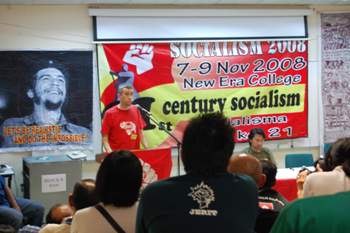 In the "21st Century Socialism Conference" which was
hosted by the Socialist Party of Malaysia (PSM, Parti Sosialis Malaysia) from
November 7th to 9th at New Era College Kajang Malaysia: there
were comrades present from many countries, including Sweden, Belgium,
Australia, Britain, Pakistan, Nepal, Taiwan, Hong Kong, Indonesia, Thailand,
Singapore, India, and Sri Lanka.
In the "21st Century Socialism Conference" which was
hosted by the Socialist Party of Malaysia (PSM, Parti Sosialis Malaysia) from
November 7th to 9th at New Era College Kajang Malaysia: there
were comrades present from many countries, including Sweden, Belgium,
Australia, Britain, Pakistan, Nepal, Taiwan, Hong Kong, Indonesia, Thailand,
Singapore, India, and Sri Lanka.
Jorge Martin spoke in the session about the Venezuelan revolution and Latin America, together with Lisa MacDonald from the Australia-Venezuela Solidarity network. Jorge explained the background to the current revolutionary wave that the continent is witnessing which is to be found in the failure of capitalism to solve the basic needs of the people. The Venezuelan revolution started from the point of view of solving problems of health, education, national control over natural resources, agrarian reform, etc, but it was met with an armed uprising on the part of the oligarchy. From 2005 president Chavez started to explain that the only way forward was socialism and that capitalism cannot solve the pressing problems that the masses face.
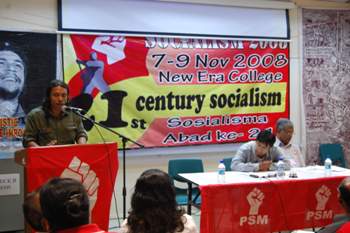 Now, according to Jorge, the global economic crisis of capitalism
can provide a momentum for the working class to build a fighting force on an
international scale. Building solidarity amongst workers from different
countries is important to face the current global crisis. The working class has
to prepare itself to replace this capitalist system in crisis with socialism,
taking over the factories, banks, and big businesses to run them under
democratic workers' control. According to Jorge only a working class which is united
internationally can carry out the revolution.
Now, according to Jorge, the global economic crisis of capitalism
can provide a momentum for the working class to build a fighting force on an
international scale. Building solidarity amongst workers from different
countries is important to face the current global crisis. The working class has
to prepare itself to replace this capitalist system in crisis with socialism,
taking over the factories, banks, and big businesses to run them under
democratic workers' control. According to Jorge only a working class which is united
internationally can carry out the revolution.
Apart from Jorge Martin, Jesus S. Anam, the coordinator of HOV-Indonesia spoke at a session on "Political Coalition". He also mentioned the importance of building the forces of the revolutionary left (from the workers, peasants, and urban poor). Transformation in the ideology and political consciousness at all levels are necessary to build a strong organization, especially a workers' organization as the most important base for a revolution. According to Jesus, in the context of Indonesia, the main priority in the left movement today is to build strong cadres with a high level of militancy. Building solidarity with the Venezuelan Revolution is a way of building that force together as the Venezuelan Revolution can become the starting point for world socialist revolution.
Meeting with the Workers of the Occupied Factory in Jakarta
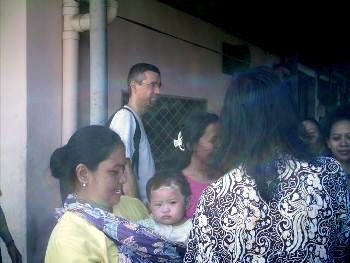 Jorge arrived at the occupied factory, PT Istana, with KASBI
comrades (Konggres Aliansi Serikat Buruh Indonesia, Congress of Indonesia Trade Unions Alliance). The trip from the
secretariat office of KASBI to PT Istana was delayed by a flood due to rising
ocean tides (a very common occurrence in Jakarta) that caused quite a long
traffic jam. With a placard saying "Selamat Datang Jorge Martin"
("Welcome Jorge Martin"), the workers received Jorge Martin and the KASBI group
and then had lunch together in one of the rooms in the factory. The workers of
PT Istana have occupied the factory for 15 months. The workers are composed of
75 women and 2 men. After giving Jorge a tour of the factory, the workers had a
discussion with him. In that discussion, present were members of the PRP
(Perhimpunan Rakyat Pekerja, Working People's Association), ABM (Aliansi Buruh
Menggugat, Workers' Challenge Alliance), FPBJ (Federasi Perjuangan Buruh
Jabotabek, Federation of Workers' Struggle of Jabotabek) and SMI (Serikat
Mahasiswa Indonesia, Indonesian Students Union). The number of people in that
discussion was more than 100.
Jorge arrived at the occupied factory, PT Istana, with KASBI
comrades (Konggres Aliansi Serikat Buruh Indonesia, Congress of Indonesia Trade Unions Alliance). The trip from the
secretariat office of KASBI to PT Istana was delayed by a flood due to rising
ocean tides (a very common occurrence in Jakarta) that caused quite a long
traffic jam. With a placard saying "Selamat Datang Jorge Martin"
("Welcome Jorge Martin"), the workers received Jorge Martin and the KASBI group
and then had lunch together in one of the rooms in the factory. The workers of
PT Istana have occupied the factory for 15 months. The workers are composed of
75 women and 2 men. After giving Jorge a tour of the factory, the workers had a
discussion with him. In that discussion, present were members of the PRP
(Perhimpunan Rakyat Pekerja, Working People's Association), ABM (Aliansi Buruh
Menggugat, Workers' Challenge Alliance), FPBJ (Federasi Perjuangan Buruh
Jabotabek, Federation of Workers' Struggle of Jabotabek) and SMI (Serikat
Mahasiswa Indonesia, Indonesian Students Union). The number of people in that
discussion was more than 100.
The discussion continued for more than 3 hours from 3pm to 6pm. Jorge explained the revolutionary process in Venezuela, the occupation and takeover of many factories there, including the spectacular takeover of the oil industry [Note: during the oil sabotage in 2002-2003].. Workers continued the production without managers, directors, and other sectors that control technology. Moreover, Jorge explained the need to consolidate the workers, to get the support of other workers' organizations at large, to cooperate with other workers' organizations in the marketing and production process, and also how to survive under the pressure and logistical limitations in running the factory. Jorge also elaborated on the continual sabotage and threat from the capitalist oligarchy. In the long term, he explained, one cannot have socialism in one factory, and the movement of factory occupations can only succeed if it becomes part of the more general struggle of the working class for nationalisation and workers' control of the decissive sectors of the economy.
Jorge emphasized the importance of intensive consolidation and raising the consciousness of the working class massively so that there will be other factories that can be occupied, not just PT Istana. The emergence of a wider occupation movement will help the next stage of the workers' movement, just like in Argentine. The discussion was quite intense. A number of people asked about the current condition of the Venezuelan workers, government support, the role of student organizations. There were also questions about the condition of Indonesian workers who are now facing the issue of the contract system, outsourcing, below standard wages, and massive layoffs. Jorge summarized all those issues with an explanation that the source of these workers' problems is the exploitative capitalist system. The current financial crisis has shown that the rottenness of capitalism is a sign that the system is not secure anymore.
The meeting was ended with a gift from the workers to Jorge and also the singing of the Internationale.
Jorge at the Discussion Panel at University of Indonesia
(The University of Indonesia is the oldest public university in the country, dating back to 1851. It is one of the most militant universities that led the student movement which toppled the Soeharto regime in 1998).
The "Global Economic Crisis" is the issue that Jorge talked about to the audience of the discussion panel, numbering around 70 people. The audience came from both trade union and academic backgrounds and it had been organised in collaboration with the Sociology Laboratory of the UI. Other than Jorge, there were three other speakers in the panel: Anwar Ma'ruf (coordinator of ABM), Dodik (the president of SB PLN, Union of the State Electricity Company), and Silvia Tiwon (Praxis).
Jorge explained clearly that the current global crisis is a sign of the rottenness of the capitalist system. The big gains of capitalism apparently rest on a very fragile footing. The correct solution to solve this crisis is to replace capitalism with socialism: nationalize the oil and gas industry, the banks, and all the important sectors of the economy under the control of the people. Anwar Ma'ruf also expounded the same idea, that socialism is the only solution to this crisis.
Silvia Tiwon from Praxis had a rather different perspective from Jorge and Anwar. One main point in Silvia's explanation is that educating the people is the starting point to face the crisis. This point of view brings forth a very critical question: can this rotting crisis be solved with partial measures?
At the end of the meeting, one comrade commented that this was an historical meeting, probably the first time that the ideas of socialism were discussed at an official meeting at UI in more than 40 years.
Jorge at Student Study Group of National University
Why socialism? Why solidarity with the Venezuelan revolution? Is Venezuela a socialist country? What is the role of the working class in the Venezuelan Revolution? These are questions asked by members of the Student Study Group at the National University who were enthusiastic to hear critical and scientific explanations from Jorge Martin.
As Jorge explained in the previous events: capitalism has been proven to be a failure. The "free market" with its unbridled quest for profits has led to overproduction. This overproduction forces the capitalists to sell their commodities cheaply. As a result, these companies face immediate bankruptcy and collapse. The effect of this bankruptcy is mass layoffs of workers and an explosion of unemployment. It is the workers who are forced to pay for this loss, not the bosses. The only solution is to takeover the key economic sectors (banks, land and important industries), put them under the democratic control of the workers through a socialist plan of production.
During the ten years of the Venezuelan revolution, we can see how the masses have defended the revolution against the oligarchy: in the 2002 coup followed by the bosses' sabotage, the 2004 referendum, and the 2006 presidential election.
The courage of the workers and the masses of Venezuela is an important inspiration for the oppressed masses and workers throughout the world and is a starting point to build the forces of the toiling people in various countries. By building solidarity with Venezuela, it means we are building socialist forces all over the world. As Trotsky explained, we cannot build socialism in one country; it has to go beyond the borders of nations. Indeed, according to Jorge, Venezuela is not yet a socialist country, the revolution needs to be completed or it will be defeated.
Meeting with the PRP in Jakarta
On Thursday November 13th, Jorge had an intense discussion with members of the PRP in their central office in Jakarta. The PRP, as the main organizer of Jorge's trip to Indonesia, is very keen to learn about the experience of factory occupations in Venezuela. Collaboration between the HOV campaign and the PRP is very possible in the near future, because consolidating workers internationally is an important point for HOV. The PRP as a revolutionary workers' organization in Indonesia can be a partner in building this force locally as well as internationally.
Jorge Meeting with Workers of the PRP in Bandung
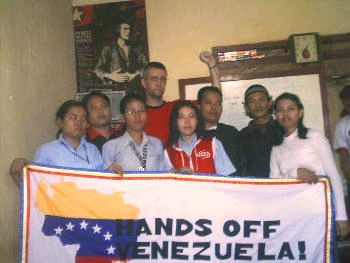 Attended by around 35 factory workers from several workers'
organizations, Jorge was the main speaker in a discussion hosted by the PRP and
KASBI in the city of Bandung. The HOV Bandung comrades were also present in
that discussion. Jorge outlined to them the revolutionary process in Venezuela.
The role of the masses that took the streets demanding the return of Chavez
during the coup was a phenomenon never seen before in the history. The workers
and the masses united to stop the coup that was being carried out by the
oligarchy with the support of the capitalist media.
Attended by around 35 factory workers from several workers'
organizations, Jorge was the main speaker in a discussion hosted by the PRP and
KASBI in the city of Bandung. The HOV Bandung comrades were also present in
that discussion. Jorge outlined to them the revolutionary process in Venezuela.
The role of the masses that took the streets demanding the return of Chavez
during the coup was a phenomenon never seen before in the history. The workers
and the masses united to stop the coup that was being carried out by the
oligarchy with the support of the capitalist media.
After that, Jorge explained the condition of factory occupations in Venezuela, where Chavez fully supports the process and workers' control of factories. He also explained the sabotage and the attempts by the oligarchy to destroy the revolutionary process toward socialism in Venezuela.
Several of those taking part in the discussion asked questions about the role of that wing of the military which is pro-worker in Venezuela, on how to run factories without logistic and technical support, how to open the market which is not yet controlled, the legal basis of the occupations, and also the situation of the workers' organizations in Venezuela, and other organizations that support the struggle of the workers.
Jorge emphasized the fact that the challenges facing the revolution in Indonesia and in Venezuela are similar (an abundance of natural resources, a huge part of the population living in poverty, foreign aid which controls the government, such as the IMF, World Bank, etc, and also the military which is opposed to the workers' struggle). But we have to learn from Venezuela that political momentum and the situation can transform the class consciousness to become an effective political movement.
Jorge closed the discussion by saying that differences in language, culture and country are not an obstacle to the spirit of solidarity in supporting workers' struggles everywhere, since the working class is one international class with common enemies, common interests and a common struggle
The Launching of HOV in the City of Bandung
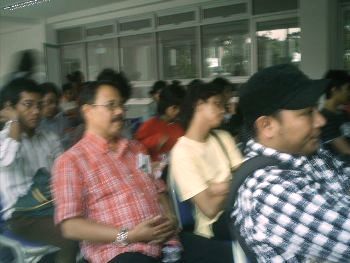 In room 29 of the Campus Centre of ITB (Institut Teknologi
Bandung, Bandung Institute of Technology), Jorge Martin was present as the main
speaker in the launching of the Bandung chapter of HOV-Indonesia.
In room 29 of the Campus Centre of ITB (Institut Teknologi
Bandung, Bandung Institute of Technology), Jorge Martin was present as the main
speaker in the launching of the Bandung chapter of HOV-Indonesia.
The launch event was opened with the screening of "No Volveran" that recounts the revolutionary process and socialist measures that have been carried out in Venezuela. In that film, we can also see how the masses of Venezuela can organize themselves and the workers who are taking over the factories and running them without the help of managers and technicians.
This launching of HOV Bandung was initiated by the Journal Ganesha ITB and individuals who agree with the principles of the HOV campaign.
In this discussion, Jorge explained that the present democracy in Venezuela cannot yet be used as a basis for genuine democracy, because several elements of power are still in the hands of the oligarchy and the capitalists. However, the process of the mass movement which is organized through communal councils and trade unions that can occupy the factories in Venezuela has raised the consciousness of the people. They fight the oligarchy by transforming democracy into "participatory democracy", and this is a starting point to build socialism in Venezuela.
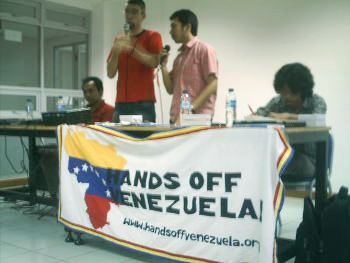 This discussion drew the conclusion that capitalism is not
the end and that participatory democracy is the first step that can bring
people to engage in politics and to take decisions in public measures, and
direct the masses toward socialism. In this case, Venezuela is one of the
concrete examples of transforming the oligarchic system (read: bourgeoisie
democracy) into participatory democracy and building socialism based on the
consciousness of the people. However, Jorge insisted that unless the old
structures of the capitalist state are done away with, one cannot have genuine
democracy.
This discussion drew the conclusion that capitalism is not
the end and that participatory democracy is the first step that can bring
people to engage in politics and to take decisions in public measures, and
direct the masses toward socialism. In this case, Venezuela is one of the
concrete examples of transforming the oligarchic system (read: bourgeoisie
democracy) into participatory democracy and building socialism based on the
consciousness of the people. However, Jorge insisted that unless the old
structures of the capitalist state are done away with, one cannot have genuine
democracy.
This launch event was closed with a call from Roliv, the coordinator of HOV Bandung, to officially establish the building of this solidarity campaign and to ask all progressive elements in Bandung to join the campaign, and to learn about the Bolivarian revolution in Venezuela in order to explore the prospects of revolution in Indonesia through the lessons of Venezuela.
(Translated by Ted Sprague from HOV Indonesia)